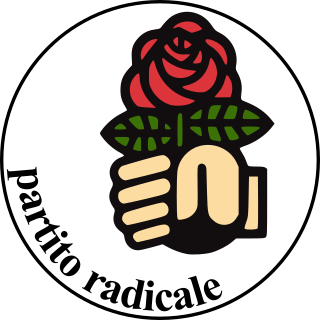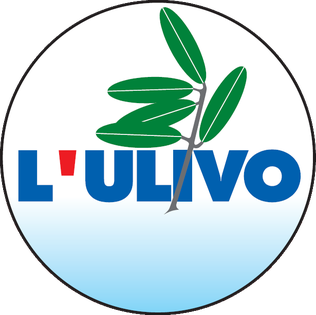This page is based on this
Wikipedia article Text is available under the
CC BY-SA 4.0 license; additional terms may apply.
Images, videos and audio are available under their respective licenses.

The politics of Italy are conducted through a parliamentary republic with a multi-party system. Italy has been a democratic republic since 2 June 1946, when the monarchy was abolished by popular referendum and a constituent assembly was elected to draft a constitution, which was promulgated on 1 January 1948.
A one-party state, single-party state, one-party system, or single-party system is a type of state in which one political party has the right to form the government, usually based on the existing constitution. All other parties are either outlawed or allowed to take only a limited and controlled participation in elections. Sometimes the term de facto one-party state is used to describe a dominant-party system that, unlike the one-party state, allows democratic multiparty elections, but the existing practices or balance of political power effectively prevent the opposition from winning the elections.

The Radical Party was a political party in Italy. For decades it was a bastion of liberalism and radicalism in Italy and proposed itself as the strongest opposition to the Italian political establishment, seen as corrupt and conservative. Although it never reached high shares of vote and never participated in government, the party had close relations with the other parties of the Italian left—from the Republicans and the Socialists to the Communists and Proletarian Democracy—and opened its ranks also to members of other parties, through dual membership.

The Olive Tree was a denomination used for several successive centre-left political and electoral alliances of Italian political parties from 1995 to 2007.

After World War II and the overthrow of Mussolini's fascist regime, Italy's history was dominated by the Christian Democracy political party for 48 years—from the 1946 election until the 1994 election—while the opposition was led by the Italian Communist Party (PCI).
The Historic Compromise, called also Third Phase or Democratic Alternative, was an Italian historical political alliance and accommodation between the Christian Democrats (DC) and the Italian Communist Party (PCI) in the 1970s.
The Communist Party of Greece (Marxist–Leninist), is a Maoist communist political party in Greece.

General elections were held in Italy on 19 May 1968 to select the Fifth Republican Parliament. Democrazia Cristiana (DC) remained stable around 38% of the votes. They were marked by a victory of the Communist Party (PCI) passing from 25% of 1963 to c. 30% at the Senate, where it presented jointly with the new Italian Socialist Party of Proletarian Unity (PSIUP), which included members of Socialist Party (PSI) which disagreed the latter's alliance with DC. PSIUP gained c. 4.5% at the Chamber. The Socialist Party and the Democratic Socialist Party (PSDI) presented together as the Unified PSI–PSDI, but gained c. 15%, far less than the sum of what the two parties had obtained separately in 1963.

General elections were held in Italy on 20 June 1976, to select the Seventh Republican Parliament. They were the first after the voting age was lowered to 18.
The Slovene Union is a centrist political party in Italy representing the Slovene minority in the Friuli-Venezia Giulia region. Its Slovenian language name means literally "Slovene Community", but the denomination "Slovene Union" is used in other languages.

Massimo D'Alema is an Italian politician who was the 53rd Prime Minister from 1998 to 2000. Later he was Deputy Prime Minister and Minister of Foreign Affairs from 2006 to 2008. He is also a journalist and served for a time as national secretary of the Democratic Party of the Left (PDS).
Sometimes media refers to him as Leader Maximo, due to his first name Massimo, but also for his dominant position in the left-wing coalitions during the Second Republic. Earlier in his career he was a member of the Italian Communist Party, and he was the first former communist to become prime minister of a NATO country and yet the only former communist prime minister of Italy.

The Tuscan regional election of 1970 took place on 7 June 1970. It was the first-ever regional election.

The Umbrian regional election of 1970 took place on 7 June 1970.

The Italian regional elections of 1980 were held on June 8. The fifteen ordinary regions, created in 1970, elected their third assemblies.

The Italian regional elections of 1985 were held on May 12. The fifteen ordinary regions, created in 1970, elected their fourth assemblies.

Proletarian Democracy was a far-left political party in Italy.

The Communist Refoundation Party is a communist political party in Italy, emerged from a split of the Italian Communist Party (PCI) in 1991. The party's secretary is Maurizio Acerbo, who replaced Paolo Ferrero in 2017. Armando Cossutta was the party's founder, while Fausto Bertinotti its longest-serving leader (1994–2008). The latter transformed the PRC from a traditional communist party into a collector of radical social movements.
The centre-left coalition is a political alliance of political parties in Italy active, under several forms and names, since 1995 when The Olive Tree was formed under the leadership of Romano Prodi. The centre-left coalition ruled the country for more than twelve years between 1996 and 2018.

















